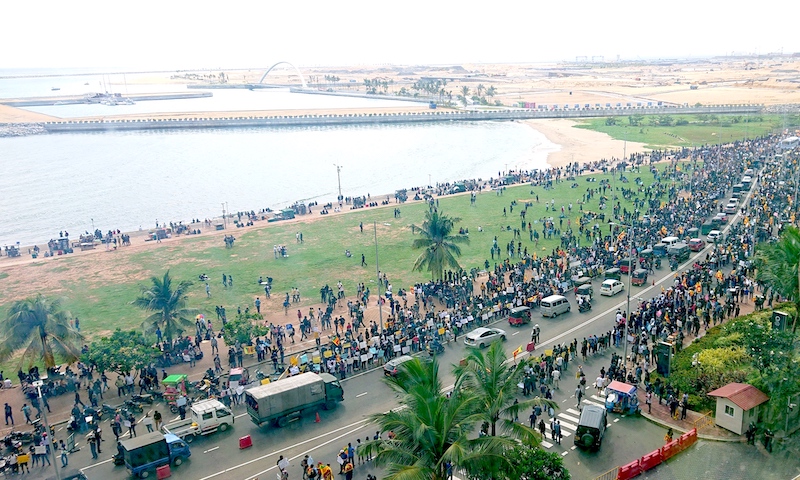Photo courtesy of Dhananjaya Samarakoon
(Prime Minister Mahinda Rajapaksa has since resigned)
Sri Lanka’s economic meltdown requires urgent remedial measures and the political impasse created by a president and his administration, which both refuse to either take responsibility or credibly effect corrective policy measures, has placed Sri Lanka in the position of a terminally sick patient who isn’t being taken to hospital for the urgently required life-saving care.
Why President Rajapaksa must go
Sri Lanka’s system of governance is not just an executive presidential system, we are the closest to an absolute presidency, like an absolute monarch, found anywhere in the world and especially after the SLPP brought in its signature 20th Amendment to the constitution, which further centralized power in the presidency. Sri Lanka under its 1978 constitution, as amended by the 20thAmendment has an executive presidency and a ceremonial prime minister, the very opposite of what we had from 1948-1978. Therefore, for any meaningful change of government power, it is the president who has to change. It is ironic that a president whose election pledge was vistas of prosperity and splendour has presided over the total destruction of Sri Lanka’s economy brought about by a combination of voodoo economics and the absolute refusal to consult, compromise and course correct. Even an A’level commerce student would be able to forecast that the combination of fiscal slippage and loose money carried out in an absolutely unrestrained manner would have catastrophic consequences. The president needs to take responsibility for the havoc that has been wrought by his administration and transition himself out of power.
The fiasco of the prime minister’s resignation
Sri Lanka had a farcical resignation of members of the cabinet as demonstrated by the fiasco of the resignation, re-appointment and re-resignation (the word created by our own recent experience) of parliament’s deputy speaker. It is clear now that there is a deep division between the president and the prime minister, the former trying to put the responsibility for the economic meltdown on the ceremonial post of the prime minister, having failed to do so by getting the cabinet to resign. It is equally clear, that the prime minister is equally determined not to be the scape goat and fall guy for a situation, which he clearly believes was not solely of his making. The reality is that the public holds the Rajapaksas as a ruling family collectively responsible for the sorry situation we find ourselves in today and is requiring a new future without them.
The other phenomena arising from the aragalaya is the discarding of the ideology of the SLPP, namely that of majoritarian ethno-religious nationalism. Just like the government of Sirimavo Bandaranaike so discredited socialism that we are now socialist only in name, the downfall of the Rajapaksas is also discrediting their ideology. The young people on the streets want a new Sri Lanka to be inclusive, pluralistic and tolerant of diversity.
Violating the sovereignty of the people
The president some weeks ago declared a state of emergency with possibly the intent to prevent mass anti-government protests, which was resoundingly rejected by the people who got on the streets anyway. The likelihood of the emergency being defeated in parliament saw the president withdrawing the measure two days later. Now, possibly egged on by hardliners running the Ministry of Defense, the president has again declared a state of emergency, even as the legal challenge to the prior declaration is still pending before the Supreme Court. As the Bar Association of Sri Lanka and the resident diplomatic community noted in statements and social media, there is no justification for a state of emergency and using emergency regulations to stifle dissent is not what the emergency is designed for. We have a political and economic problem, not a military and security one. While the LTTE and the JVP insurrection posed an armed challenge to the state, the aragalaya poses a political challenge to the government. The people of Sri Lanka are sovereign and unleashing state violence on the people engaged in voicing their dissent is a violation of the sovereignty of the people. It will seriously and permanently diminish the military in the eyes of the citizens.
Unleashing state security on the organized but non-partisan protest movement and seeking a sequel to the Rathupaswala shooting by the Army of unarmed civilians is a very unwise decision that the generals in the Defense Ministry should seriously reconsider. The consequences are likely to be dire. India is bailing out the country financially, much more than China, which is refusing to restructure their exorbitantly priced debt. The Indians are unlikely to want an escalation of the instability caused by state violence. The Army still holds on to lucrative UN peacekeeping roles in Mali and elsewhere even as there are growing calls for their use to be re-examined. A bloody crackdown on civilian protests will be the final nail in the coffin of Sri Lanka’s peace keeping operations. The Army Commander is already a sanctioned individual under US law; it is not in the interests of the military to keep having a long list of officers as sanctioned individuals. Anything the military does now will be in the centre of our capital city in the full glare of global publicity and recorded on countless smart phone videos.
Some in Sri Lanka, who should have known better, wanted a Hitler-type leader. It may be instructive to reflect on how that experience resulted in the destruction of Germany and the last days of the Berlin bunker. What we really need now is a Nelson Mandela, an unifier who brings us together, makes the difficult choices and navigates the uncharted waters ahead as we seek the way back from the self-destruction that was thrust upon us as a nation.
